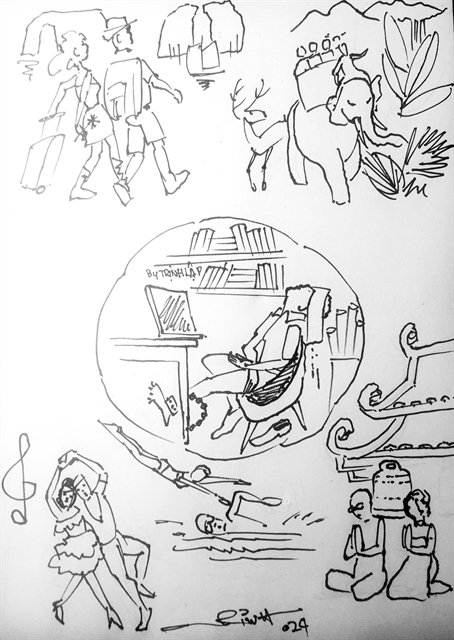 |
| Illustration: Trịnh Lập |
Written by Anne Fong
Recently, the word “healing” has become a hot topic on the internet and has become a catchphrase.
As social media became an outlet for people stuck at home during the pandemic, many people gradually opened up about their mental health issues, sharing their experiences on various platforms such as TikTok.
“Healing” has emerged as a comforting message for young people, especially Generation Z, who are described as tech-savvy, creative and independent, but are also experiencing psychological distress. This message is conveyed through diverse content and formats with a positive spirit.
“Seeking peace and healing for physical and mental wounds, letting go of negative thoughts and emotions, and living a more meaningful life are common needs among young people,” said my friend Thanh Nguyen, 31. speaks. vietnam news.
Ms. Thắng currently works at a well-known marketing agency in Ho Chi Minh City and frequently interacts with her younger colleagues.
He says a variety of “healing” methods and services, such as traveling, connecting with nature, participating in social activities, meditation, listening to podcasts, and tarot readings, can help mend emotional wounds and relieve emotional distress. It has been accepted by many young people as a way to escape. Current life pressures and stresses, including financial and work-related pressures.
My best friend’s sister, Thanh Tran (23), is under a lot of stress due to work and family pressures.
“Although I am relatively young, I always feel tired due to my busy work schedule. Pressure from my boss and financial stress push me into a non-stop cycle and I don’t have time to rest. “I work 14 hours a day and only have Sundays off,” she says.
Feeling defeated, Tine asked her boss to take a week off on a “healing” trip in hopes of relaxing, relieving pressure and negative emotions, and regaining her motivation to work.
I empathize with Thanh’s experience, as I too have faced burnout and taken time to rejuvenate on a healing journey.
That being said, even though “healing” was initially accepted as a truly positive message, many people have become increasingly fed up with it and sometimes refer to it in a sarcastic manner.
It’s become a bit of a cliché on social media, with people claiming that every little thing they do is “healing” even if they’re not actually experiencing emotional distress. Some people seem to use it just to get attention.
Thắng’s views on social media are spot on. Social media has helped reduce the stigma surrounding mental health, but to some extent it has also glorified and glorified it.
In psychological terms, true healing takes time. This is similar to the healing process for a physical wound. It’s okay to use words like relaxation and comfort, but it’s important not to overuse them and dilute their meaning.
I have observed numerous discussions on this topic and have found it to be very controversial.
While the need for individuals to work on healing is understandable, it is important to consider how your healing process will affect others.
“Everyone should be aware of their surroundings and responsible for their work ethics,” says Thắng.
Giang Trần, 28, a mutual friend of Thắng and I, says he has had experiences with younger colleagues who took advantage of their need for healing and “ghosted” them, abandoning their team’s work.
“Because I was leading the project and taking full responsibility for the outcome, my colleague’s healing process damaged my ability to do my job and, as a result, my mental health. ” she says.
“I felt it was unfair that at the end of the day we all got paid the same, even though I had to work more,” Jiang added.
Everyone agrees that not all problems require a cure.
“If it doesn’t stem from a truly serious psychological problem, young people’s constant search for healing can hinder their growth,” Thắng says.
Meanwhile, Tan believes that young people need to actively strive for self-improvement to overcome pressure and maintain mental balance.
“This is one of the major personal development goals I set for myself this year,” Thanh asserts.
In my opinion, individuals need to develop their ambitions and pursue their desires instead of focusing only on healing.
“Individuals should practice a healthy lifestyle, including using electronic devices sparingly, participating in exercise, and avoiding stimulants,” Thắng commented.
He emphasizes the importance of assessing whether one’s living environment matches one’s strengths, personality, and abilities.
“The tendency to abuse healing as a means of avoiding difficult realities, as we see in some young people today, is discouraged,” Jean warns.
“I empathize with my Gen Z colleagues, but I believe that if this trend continues, our country will not be able to raise a strong, mature young generation. Youth offers many opportunities, but it is difficult to succeed. It is imperative that people seize opportunities,” she added.
Rather than healing, we need to make ourselves stronger and more resilient to overcome challenges and reach the finish line, like marathon runners. At the end of the journey, life will give us the badge of “no regrets”.
In my humble experience, young people should realize that not every setback requires massive healing. Healing should be given to those who are truly suffering and hurting.
Once healed, it is important to re-engage with work and life with a positive mindset and positive attitude.
Mere healing without subsequent dedication and effort may not be true healing at all. -VNS

